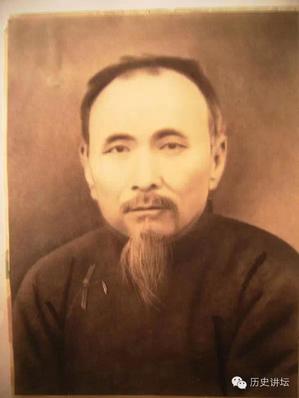Master Du Xinwu (杜心五) [1869-1953]Translator’s Note: Master Du Xinwu was a contemporary of Qianfeng Daoist Master Zhao Bichen (1860-1942). Today in Beijing, Qianfeng Daoist Master Zhao Ming Wang (b.1966) is the great grandson of Zhao Bichen – and the Family Lineage inheritor of the Qianfeng School. Zhao Ming Wang has written a blog entry about the martial encounter between his great grandfather and Du Xinwu – this can be read in English translation here:
VENERABLE ZHAO BICHEN FIGHTS MASTER DU XINWU Like all extraordinary masters in China, Du Xinwu began training in gongfu as early as 6 years old and had many adventures along the way. He was involved in revolutionary politics, and was politically active in both the Nationalist and Communist Governments of China. Although having worked as a bodyguard (as did Zhao Bichen), Du Xinwu was also a very capable scholar (again, as was Zhao Bichen). In Japan from around 1900, Du Xinwu studied at the Tokyo Agricultural University. This in-turn allowed him to pursue an academic career in Beijing upon his return to China not long after the 1911 Xinhai Revolution that effectively ended the Qing Dynasty – and China’s imperial era. He was considered a renowned academic, and his viewpoints regarding agriculture were keenly sought after, even though in his private life he pursued inner development and martial arts mastery. When he fought Zhao Bichen, however, the contest was a draw, and Du Xinwu received Daoist instruction from Zhao Bichen – and both men became friends. According to this Chinese language text describing the lives of a number of tradition Chinese martial artists, Du Xinwu literally sat cross-legged and passed away whilst in meditation. Within Chinese Buddhist and Daoist practice, this is referred to as ‘Seated Transformation’ (坐化 – Zuo Hua), and only those who possess the highest spiritual and moral characters are said to be able to achieve it. ACW 8.3.2016 Master Du Xinwu (杜心五) [1869-1959] also wrote his name as ’杜心武’ – which although still pronounced ‘Du Xinwu’ – had the second character of his first name - ‘五’ (Wu) meaning ‘5’, - replaced with the character ‘武’ meaning ‘martial’. He was originally known as ‘慎媿’ (Shen Kui). He was born during the 8th year of the reign of Qing Dynasty Emperor Tongzhi (Branch and Stem Year Yi Si ‘己巳’), on the 3rd day of the 11th lunar month. He was born in the Cili County area of Hunan province. Since an early age, he travelled around China seeking-out genuine martial arts teachers, before finally receiving instruction from Master Xu Daxia (徐大侠) who eventually passed his martial arts lineage to Du Xinwu. Under Master Xu – Du Xinwu developed an incredible degree of martial arts mastery and extraordinary skill. Du Xinwu travelled to Japan to study, and joined the Revolutionary League of Sun Yatsen (孙中山) after befriending Song Jiaren (宋教仁). After the 1911 Xinhai Revolution, Du Xinwu returned to China and was appointed as a senior teacher at the Peking Forestry Institute (founded by Song Jiaren). Not only was Du Xinwu an outstanding academic (having studied agriculture in Japan), but he was also an exceptional martial artist. This eventually led him to become the bodyguard of Sun Yatsen, and to found the traditional martial art school of defence and attack known as ‘Natural Gate’ (自然门 – Zi Ran Men), which was respected and highly regarded throughout Beijing, producing a generation of very good martial artists. During the Anti-Japanese War, he served in the national government, but was often an outspoken critic of Chiang Kai-Shek and the Nationalists. After the liberation of China (1949), Du Xinwu served as an Advisor for the Political and Military Committee of Hunan, and was a Commissar of the Chinese People's Political Consultative Conference, Hunan Province. On July the 8th, 1953, Du Xinwu sat in the crossed-legged, seated meditation posture, and peacefully passed away at the age of 84 years. Central Committee Members Lin Boqu (林伯渠) and Xu Teli (徐特立) sent a message of condolence on behalf of the National Government (and the people). The famous artist and painter Xu Beihong (徐悲鸿) said in his letter of condolence the following; ‘Mr Xinwu was a master who had no peers. He achieved this level of extraordinary mastery because his practice of moral virtue was impeccable.’ The Hunan provincial CPPCC Provincial Committee, and United Front Work Department sent wreaths. ©opyright: Adrian Chan-Wyles (ShiDaDao) 2016. Original Chinese Language Source Article: http://sl.china.com.cn/2015/0727/1129.shtml 杜心五 杜心五(1869一1953),又称杜心武,原名慎媿,清同治八年(己巳)十一月初三日,出生于湖南省慈利县。自幼得到过江湖武术奇人徐大侠的点拨和真传,学得旷世武功、身手不凡,青年时代东渡日本求学,并加入孙中山领导的同盟会,辛亥革命之后回国担任宋教仁先生创立的北平林业讲习所(北京林业大学的前身)的高等教员,并曾经担任过孙中山先生的私人保镖,武术造诣极深,创立了传统武术的散打技击之术“自然门”,成为一代享誉京师的武林大家。 抗战时期曾在国民政府任职,时常口无遮拦批评蒋介石和国民政府。解放后担任湖南省军政委员会顾问、湖南省政协委员等职。1953年7月8日,八十四岁的杜心五在打坐时安然去世。时任中央委员的林伯渠、徐特立均发出唁电。画家徐悲鸿在唁信中称,“心五先生卓艺绝伦,令德昭著”,湖南省政协、省委统战部均送了花圈。 他收有高徒万籁声,步其后尘也成为一代武术大家。 |
